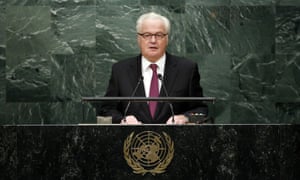Making Influential Friends, Old and New for Russia
Can we agree that Russia was taken by surprise when, by a whisker of an almost tied vote it was denied its expected readmission for membership on the United Nations Human Rights Council? Beaten by Hungary and Croatia, just two votes making the difference. After all, the HRC couldn't be compromised by the presence of a country whose president makes it a point to reinvest in Greater Russia, nostalgic for the superpower status of the USSR. All of which might be understandable to a degree, but its foray in Syria, helping a regime slaughter its own apparently is a cut too far. |
| Vitaly Churkin, the Russian envoy, said the countries who beat Russia ‘are not as exposed to the winds of international diplomacy’. Photograph: Xinhua/Rex/Shutterstock |
So the UN succumbed to pressure from outraged groups like UNWatch and the backlash against Russia that outrage sometimes elicits, while seeing nothing untoward in absorbing Cuba, China, Saudi Arabia and Venezuela, exemplars of human rights abusive nations, remaining on the Human Rights Council. You win some, and then you forgive some. If all the abusive nations that sanctify their right to impose capital punishment hearking back to the stone age were to be removed from the Council, good grief who would be left to take their place?
Russia has particularly endeared itself of late, well earning the defeat it suffered even though the margin of defeat was so slender. President Vladimir Putin either sneered at the outcome or suffered a brief breakdown of rage overtaking his normally sunny outlook on life that a renewal of military gear and adventurism in the military sphere seems to awaken in him. Who else has intercontinental ballistic missiles as powerful as the Kremlin's with a rang of 11,000 kilomeres, "Capable of wiping out parts of the earth the size of Texas or France", according to its state news outlet Sputnik.
NATO has built up its Eastern Europe presence, a not-too subtle declaration to Moscow that further military action in Crimea and Ukraine would be looked at askance, to say the least. Even so, Lithuania is in the process of preparing for the eventuality of a Russian invasion, alerting citizens with advice on survival techniques. And Poles have been joining volunteer paramilitary groups with amazing alacrity and in telling numbers. Vladimir Putin has been making his neighbours quite edgy.
Imagine, a member of the permanent UN Security Council being chastised by the UN Secretary General when Ban Ki-moon had the unrestrained effrontery to interpret recent attacks by Russian warplanes on Syrian civilians, hitting schoolyards, women, children and hospitals, leaving ample rubble behind as civil infrastructure is destroyed as war crimes. The regime's barrel bombs a counterpoint to Russian airstrikes declared to constitute war crimes.
![The creeping Russian border in Georgia Russia's border creep is nothing new and dates back to 2008, writes Coffey [Getty]](http://www.aljazeera.com/mritems/imagecache/mbdxxlarge/mritems/Images/2015/7/22/edcfbea734f747d9a3c9ed26d496cfe6_18.jpg) |
| Russia's border creep is nothing new and dates back to 2008, writes Coffey [Getty] |
And back in Georgia the Kremlin has been busy ordering its military to readjust "state borders", sending out bulldozers to help as Russia extends its reach into Georgia with a frontier of its own devising. A dirt track runs through Georgian villages to separate the Republic of South Ossetia, that self-proclaimed breakaway state that Moscow has financed, defended and maintains control of. It predated Moscow's little adventure in east Ukraine which would never have developed had Ossetia's separation from Georgia not been defended to begin with.
And then there is Abkhazia in western Georgia and the Moldovan enclave of Transnistria, all "frozen zones" representing areas of Russian control though they are deep within sovereign neighbouring states. Strongholds to prevent NATO destabilizing and enrolling another country in Russia's 'near abroad', unsettling the Kremlin and infuriating Mr. Putin. Green border signs pop up along the boundary lines warning "passage is forbidden" across areas that were once part of the nations Moscow has sundered.
Georgians from nearby villages occasionally discover they are on the 'wrong' side and suddenly they're under arrest by Russian border guards or by local security officers. Europe has a monitoring mission organizing monthly meetings of Georgian, Russian and South Ossetian officials to resolve issues of recovering strayed cattle and disputes over who owns a vineyard or apple trees.
"Russia starts right here", said Vephivia Tatiashvili from Jariasheni, Georgia, of a freshly dug track separating his house which he can no longer claim ownership of, from land in Georgia. "But who knows where Russia will start tomorrow or the next day?" The amazing shrinking national territories, neighboured by expansionary Russian authority.
Labels: Conflict, Georgia, Human Rights Council, Russia, Syria, United Nations

<< Home